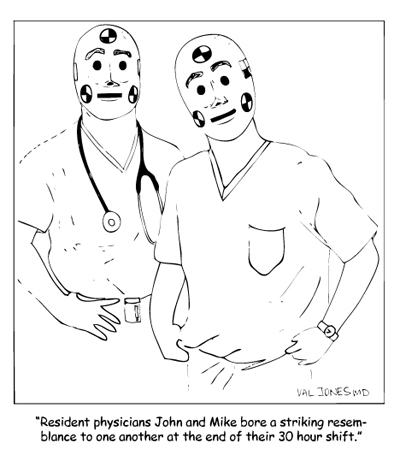Latest Posts
Heard Around The MedBlogosphere, 12.22.08
Here’s my weekly round up of quotable quotes from my peers:
NHS Blog Doctor: Antibiotics do not cure snot. [Please go to the site for a fabulous illustrative photo.]
KevinMD: Since work-hours were restricted in 2003, there are no studies that have shown any marked improvements in patient safety or outcomes. Worse, errors have arisen from the so-called “patient hand-off,” the period of communication where rested doctors replaces those who are fatigued. Does increasing the frequency of patient hand-offs outweigh the benefit of better rested doctors?
Richard Reece, MD: The moral for doctors: Don’t expect as much leverage as in the past when negotiating with hospitals, even though you represent their main revenue stream.
Paul Levy: The medical community in Boston likes to boast about the medical care here, but we don’t do a very good job holding ourselves accountable.
Dr. Wes: Thanks to exorbitant costs of implementing EMRs in physician practices, the Medicare requirements for billing and prescribing electronically, and the prohibitive documentation requirements mandated by CMS in the name of “quality,” independent physician practices of all types will have no choice but capitulate to larger entities that have a fully integrated electronic medical record paired with collection software.
Heart found in a car wash (h/t Dr. Wes)
Ramona Bates, MD: I don’t think I would ever want to be part of doing a posthumous face lift or blepharoplasty or other cosmetic procedure, but I would be willing to debulk tumors if it would help families or individuals say “goodbye” more easily.
WhiteCoat Rants: For $79 you can blow into your iPod and it will play you a song if your blood alcohol is more than 0.08. You know this device wasn’t made for parents.
Just what we need. A bunch of drunk teenagers farting around with their iPods and getting into a “who can get the highest blood alcohol” contest.
The Happy Hospitalist: It frightens me to hear people say they want to work in medicine and work in a similar capacity as physicians, evaluating, diagnosing and managing disease, but not want to put in the time and sacrifice to be residency trained in depth and scope…
Science-Based Medicine: Our soldiers, grievously wounded in combat, deserve only the best science-based therapy available… If I were to propose treating our injured soldiers with bloodletting and toxic metals (both common methods in the 1700s and early 1800s) based on the concept that it would put the “imbalance of the four humors” back into balance, the Pentagon and the military medical establishment would toss me out on my ear as a dangerous quack–and rightly so. But introduce a method that claims “ancient Chinese wisdom” based on somehow magically redirecting the flow of a mysterious “life energy” by sticking small needles into parts of the body that correspond to no known anatomic structures through which “qi” flows, and suddenly the Air Force is funding a program to train medics and physicians treating our wounded soldiers how to do this method based on the same amount of convincing scientific evidence that qi exists as for the four humors (none) and in the face of no strong clinical evidence that it’s any better than a placebo.
Rural Doctoring: Hospitalists, take note: this is an example of why people go ape-sh*t crazy in the hospital:
• Her right arm is completely immobilized to protect the graft site.
• Her left arm has a heplocked IV in it.
• Half her head is shaved because the surgeon took the donor skin from the scalp.
• She’s vegetarian and the cafeteria sent her chicken for lunch.
• Dinner was vegetarian but she can’t really cut up a baked potato with only one hand.
• The hospital has double rooms and is running at capacity, so the staff is harried.
• Her roommate is an elderly, demented woman who keeps trying to get out of bed by herself and objects to the TV being on. So far, all she’s said to us is “Mind your own business!”











